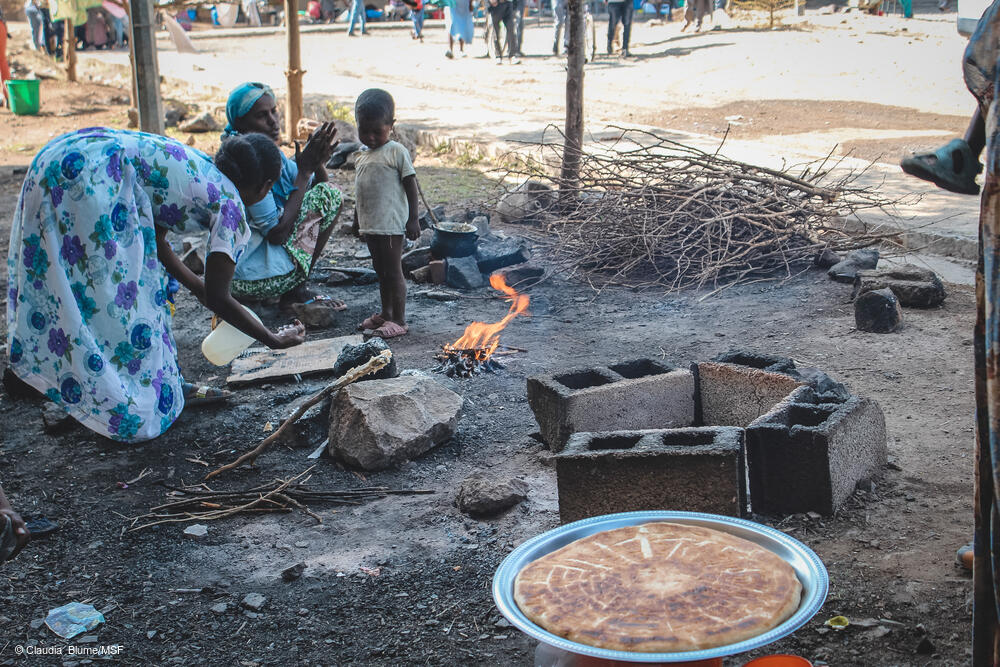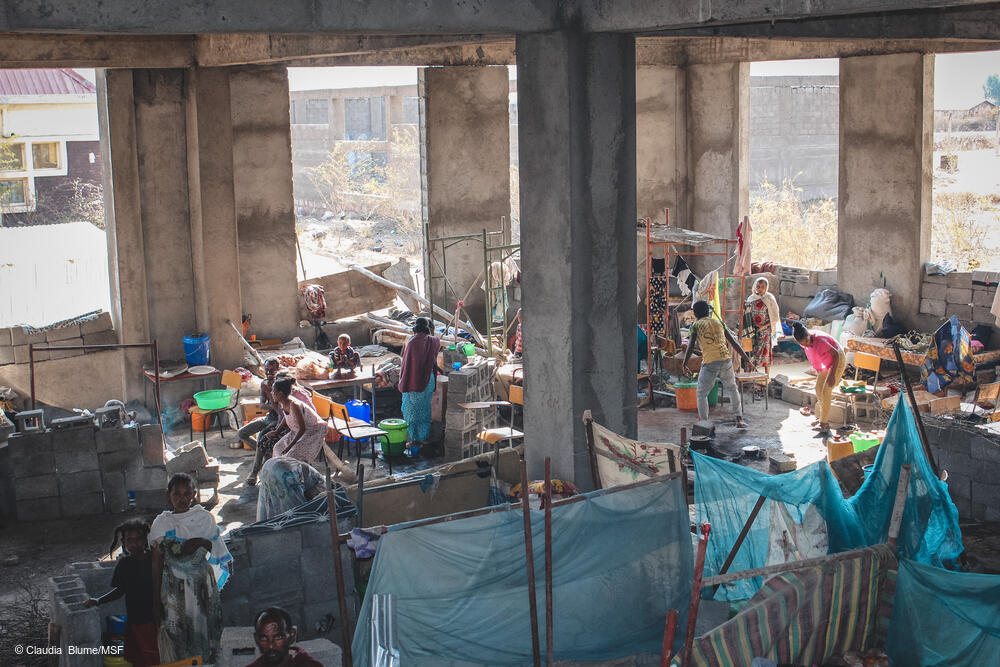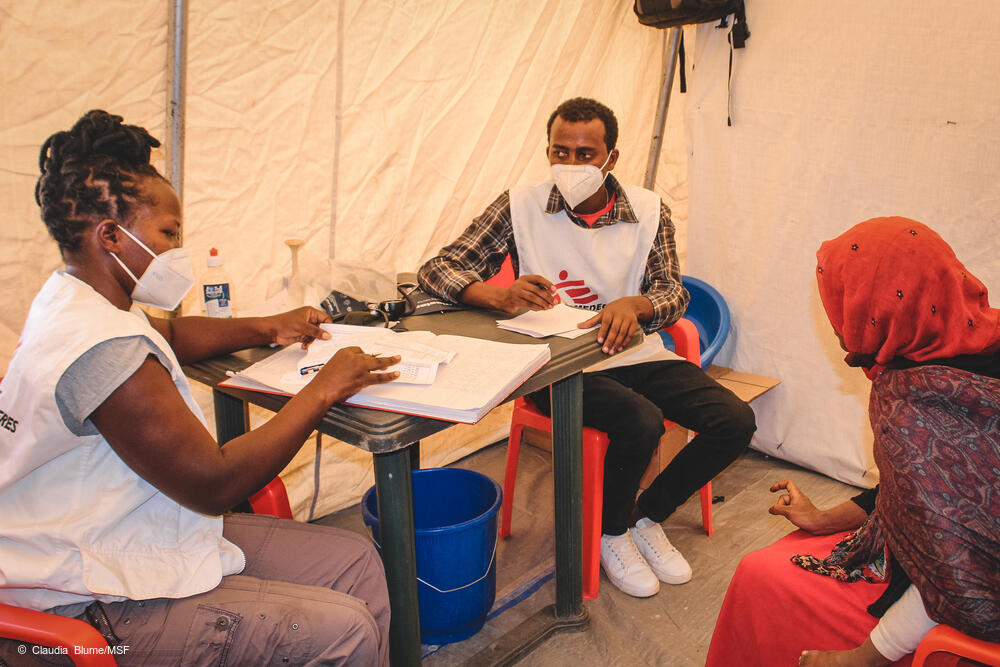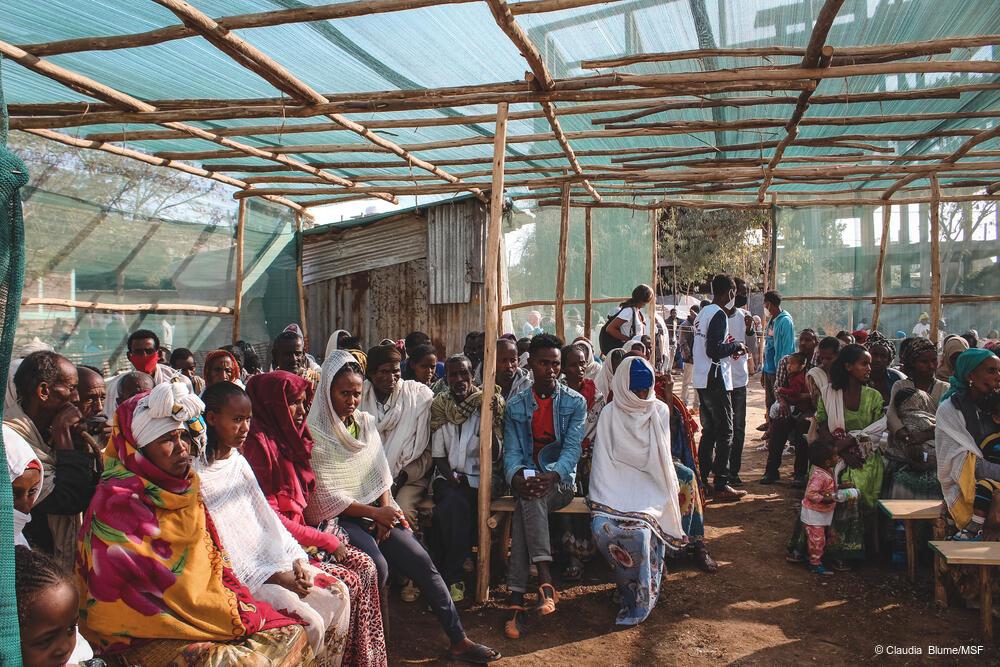Thirty-year old Aster* sits in the waiting area of MSF’s primary health clinic at a site for displaced people in Shire. She is eight months pregnant and has come for an antenatal check-up. She fled with her husband and two young children from a village in Western Tigray when fighting broke out in November, and now lives with a local family. She says she feels stressed. “I have not received any food aid. We are getting some food from the people we are staying with, but it is not enough, “says Aster. “Sometimes, I go out to beg. If they don’t give me anything, we sometimes sleep without having eaten. It is difficult to be dependent. It makes me empty inside. Before, the children had regular meals”.
Tens of thousands of people have arrived in Shire, a large town in North West Tigray, since fighting broke out in November. Most are from Western Tigray. The majority stay with the host community, but almost 20,000 people live in informal sites. They sleep in cramped and often unhygienic conditions in the classrooms of several schools, as well as on the campus of Shire University.
Risk of a nutritional crisis

As the only donation most people have received is wheat, they eat bread every day.
People’s number one concern is a lack of food. There have been several food distributions - and with more aid organizations recently arriving, the numbers are increasing - but people say it’s not enough and that the distributions are often unfair, leaving some people with less than others or even nothing at all. Nobody is formally in charge of the sites, and displaced people appoint community representatives from their home areas to organize distributions and other matters. Some people sell food donations to buy blankets or other things they need.
All of the food that has been donated so far are bags of wheat and some cooking oil. That means that what most people in the sites eat every day is only bread – which is not nutritious enough, especially for children, pregnant mothers and sick people.
60-year old Demsas* has type 2 diabetes for which he recently received tablets from Shire hospital. “The doctor advised me to eat a variety of food – goat meat, milk, injera - but I can’t afford it. Before, I was a farmer and a butcher and ate well, but when I came here, we just received some wheat.”
Most shops are now open in Shire and there is food available in the market, but most people have no money to buy it. The city’s civil servants only recently received their first salary since the fighting started, and even those who have money in the bank cannot access it because most banks are still closed. The price of food and other items has gone up, and many of the displaced people did not bring any money.
MSF carried out a nutritional survey with children under five in the sites and found that while the situation is concerning, it is not at emergency level yet. “What we saw was that the overall global malnutrition rate in the sites was about 11 percent. There was 9% moderate and 2 % severe malnutrition, which is under the emergency threshold. There is food instability and there is definitely a risk for it to become a nutritional crisis. We have to keep a close eye on it,” says MSF medical team leader Juniper Gordon.
Curfew is a major obstacle for pregnant women

Hundreds of people in Shire’s University IDP site live in an unfinished building, where they sleep, cook and eat. Many don’t have mattresses or blankets.
Living conditions in the sites are rough. Dozens of people sleep in each of the former classrooms of local schools, between desks and chairs. Some have received mattresses and blankets from the community while many others just sleep on the floor or on plastic sheeting. With insecurity still ongoing, people continue to arrive in large numbers. Many of the newcomers have no choice but to sleep outside or in makeshift shelters in the sites. Most have fled with few possessions, many just with their clothes on their backs. Some still wear the same clothes they left their homes in, more than three months later. Some women say they had to tear apart some of their clothing to make sanitary pads, which is a source of humiliation.
On Shire’s university campus, hundreds of people are staying in former student dormitory buildings, sleeping in bunk beds. Those who have not found a place in the dormitories stay in an unfinished building on the campus. With bricks placed around their sleeping areas, families are trying to create a resemblance of privacy. Only some people have mattresses or beds, most sleep on the concrete floor. There are no walls to protect them from the cold at night. There is smoke from fireplaces everywhere, and the ever-present sound of people coughing.
In the clinics that MSF has been running in the IDP sites since January, respiratory tract infections are the main morbidity our teams are seeing. Is it COVID-19? Nobody knows for sure. There are no tests available, and there is no way for people to keep a safe distance from each other in the overcrowded sites, no way to buy masks or wash their hands frequently. Compared to the many other issues people are facing, COVID-19 is low on the list of people’s worries.
Diarrhea is the second-biggest medical problem, due to a lack of clean drinking water and sanitation, and unhygienic living conditions. MSF has built latrines in an IDP site in a primary school and carries out regular water trucking. Our teams have also rehabilitated a large toilet and shower building on the University campus. Water supply is not a just an issue in the IDP sites, but the whole of Shire town.
I am worried what will happen if the baby is born at night, after the curfew. I don’t know how to get to the hospital then.
Living conditions are particularly hard on pregnant women. 26-year old Adiam* has fled from a village near Humera and now lives in the University site. She is eight months pregnant with her first child.
“Delivering a baby in these circumstances will be difficult, but I am glad I am here with my family. Many other families have been separated. I want to deliver at the hospital but I am worried what will happen if the baby is born at night, after the curfew. I don’t know how to get to the hospital then.”
After 6.30 pm, people cannot leave their homes, and while ambulances are in theory allowed to operate, none are available. Until recently, there was also no staff in the hospital after dark, leaving patients on their own during the night. MSF is giving expecting mothers safe delivery kits in the IDP sites in case they go into labour after dark.
Adonay*, a healthcare professional from Western Tigray who lives in the University site, says he has helped deliver three babies there.“ I delivered them inside the dorms, in the women’s beds. There were many people around. There was no privacy. Fortunately, all deliveries went well. At that time, no health centers were open or staffed. We are several health care providers living in this site, and we have been able to help people before MSF and other organizations arrived.”
Patients with chronic diseases are without medication

Shire hospital serves a population of more than one million people in the area. After fighting broke out in the city, many staff members did not return to work for a long time, some out of fear for their safety, others out of a lack of motivation because they did not receive any salary.
Patients with chronic diseases such as diabetes or hypertension face some of the biggest challenges. They have not received any medication for months. “Diabetic patients have not had insulin for three months, which is very dangerous,” says Juniper Gordon. “In the camps, some patients who have TB and HIV also have not had medication for months. Now, the central pharmacy board in Shire is up and running and they are trying to get medication to the facilities. For some medications like insulin that needs a cold chain it is a big challenge – there has not been electricity until the beginning of February in Shire, and it is still not reliable. In the majority of regions outside of Shire there is still no electricity.”
Dr. Berhane Tesfamichael is the medical director of Shire hospital. He says the lack of insulin had a severe impact on several of his patients in the period after the fighting started.
“Five patients died at the hospital because of a lack of insulin. We sent the patients’ attendants to Adwa and Aksum hospitals. They went on foot, they took the risk to safe their relatives’ lives. Unfortunately, there was no insulin available there either. We reported it to the regional health authorities, but the problem was the transport and the security.” Even though insulin recently arrived in Shire’s central pharmacy stock, it is still not possible to distribute it to health facilities and patients in need in the rural areas.
Shire hospital serves a population of more than one million people in the area. After fighting broke out in the city, many staff members did not return to work for a long time, some out of fear for their safety, others out of a lack of motivation because they did not receive any salary. Both staff and patients had no food at the beginning, and when MSF arrived, we supplied the hospital kitchen with food and cleaned the facility as no cleaners had come for weeks. The hospital was not badly looted, but there have been many robberies at night in the past few months because no staff was present. MSF is supporting the pediatric ward, the in-patient therapeutics feeding center as well as water and waste management activities at the hospital.
Most of the staff has now returned and Shire hospital is almost fully functional. However, many issues remain – such as a lack of supplies, power cuts and security issues for patients, especially at night. Apart from the emergency unit, the wards are not busy. Unlike before the crisis, few patients from rural areas are coming now. The referral system has collapsed and without ambulances, insecurity in many areas and many people not being able to afford the transportation costs to the city, many find it impossible to get to the hospital.
Stigma around sexual violence
One of the issues that Dr. Berhane is most worried about is that not many survivors of sexual violence are seeking help.
“Many women get raped but they don’t seek help. They are hiding at home. The women want to go to the hospital, but the culture, the stigma, social norms prevent them. We have emergency contraceptives, prophylaxis – the problem is, we can’t get the patients. We need to increase health education, community mobilization and home visits.”
MSF was initially facing a similar situation in our clinics in the sites. Our staff hear many stories about sexual violence from the community, but not many women were coming for care. The number of survivors seeking care is increasing, possibly because more people now know about, and trust, MSF’s services. Between February 15 and 22, ten survivors of sexual violence received treatment and psychosocial support.
MSF offers counselling and psycho-education sessions in the IDP sites. Many people have been deeply traumatized by the violence they have experienced, by their displacement and bad living conditions, as well by being separated from family members, often without knowing their whereabouts.
“We all have trouble sleeping,” says 43-year-old Tesfaye* who lives at the High School site with his family. “We are all thinking about our houses, our businesses, our children who are not going to school. My eldest daughter, who is 14, was one of the best students in her class. She has not been in school for about a year – first because of COVID-19, then because of the fighting. She is very upset.”
Many displaced people are also worried about their future, whether they will be able to go home one day. They also concerned about whether they will be able to stay in the sites.
The health system in rural areas has collapsed

MSF midwives during an antenatal consultation at MSF's primary health clinic in Shire's Primary School IDP site.
While the situation for displaced people in Shire is difficult, it is far worse for people living in areas outside of Tigray’s main towns.
Birhane* is a 58-year old farmer who is sitting in the waiting area of MSF’s primary health clinic at the University IDP site. With his weathered face, traditional white headscarf and stooped, thin body perched on a walking stick, he looks much older. He says he has walked 2 ½ hours from his village to get medical care. Birhane says that the health center that served his farming community of 2,500 people has been closed since November, and that all six staff have left. “We are suffering from a lack of medical care. We don’t have any medication; the village’s two ambulances were taken. Many people are sick. Three pregnant women have died during childbirth in the past three months,” the farmer says. “There is no food in the village. Our fields have been looted. Some of our women have been raped. We stayed for two months in the forest and we are still scared.”
Since the end of January, MSF is sending mobile medical teams to provide patients in villages and towns north, east and south east of Shire with primary health care. We are also supporting some health facilities with medical supplies and just opened a base in the north-western town of Sheraro, from where we are supporting the town’s rural catchment area.
Most of the health facilities our teams have visited are not functional. Many were vandalized and looted and in most facilities, the staff has left. Most people have not received any medical care since November.
Berhe*, a health professional working with MSF, says that the region used to have a well-functioning health system before the fighting started. Villages had health posts and there were health centers in smaller and hospitals in bigger towns. There were health extension workers visiting communities and a referral system with ambulances. “Now, the health structure is completely destroyed. When we visit rural areas, mothers say: “My child is three months old. He has not been vaccinated yet. Maternal and child health is very difficult now. During one of our mobile clinics, we heard that a delivering mother died because she could not get assistance from health professionals. In the rural areas there are no health structures, no ambulances.”
As access to towns and villages along the main roads in northern Tigray is getting easier, we are now trying to reach people who are living in the bush, says Juniper Gordon.
“These are the people who really cannot access any kind of healthcare. We try to get there and give a bare minimum of healthcare and see their condition. We hear of people who have been in the bush for months and still don’t feel safe enough to go to the clinic.”
